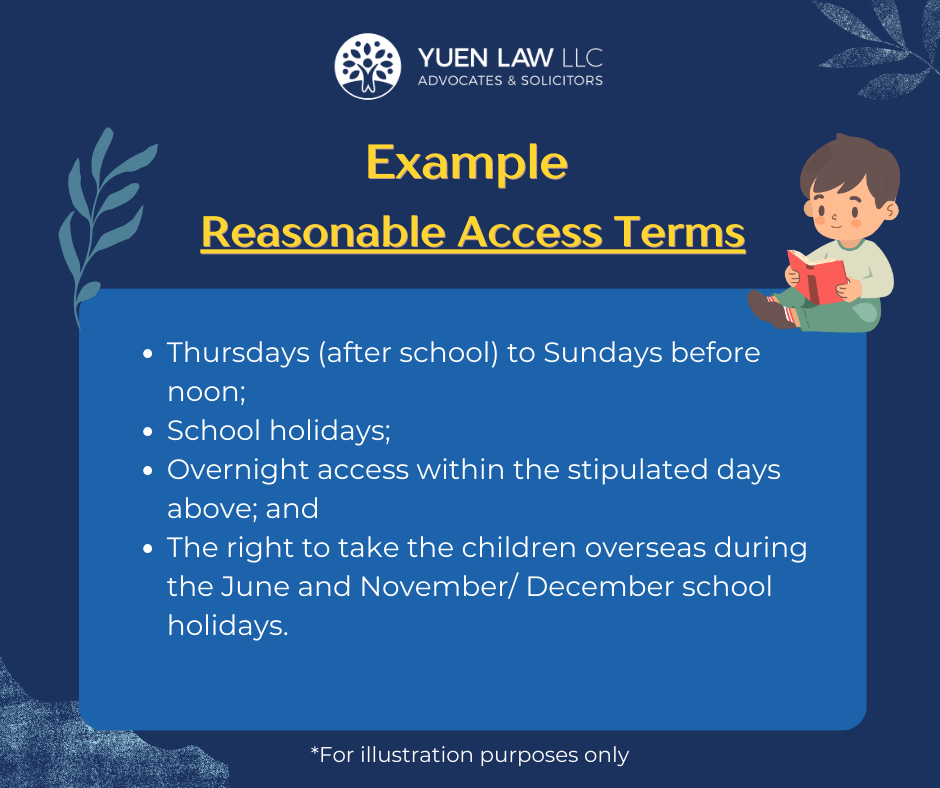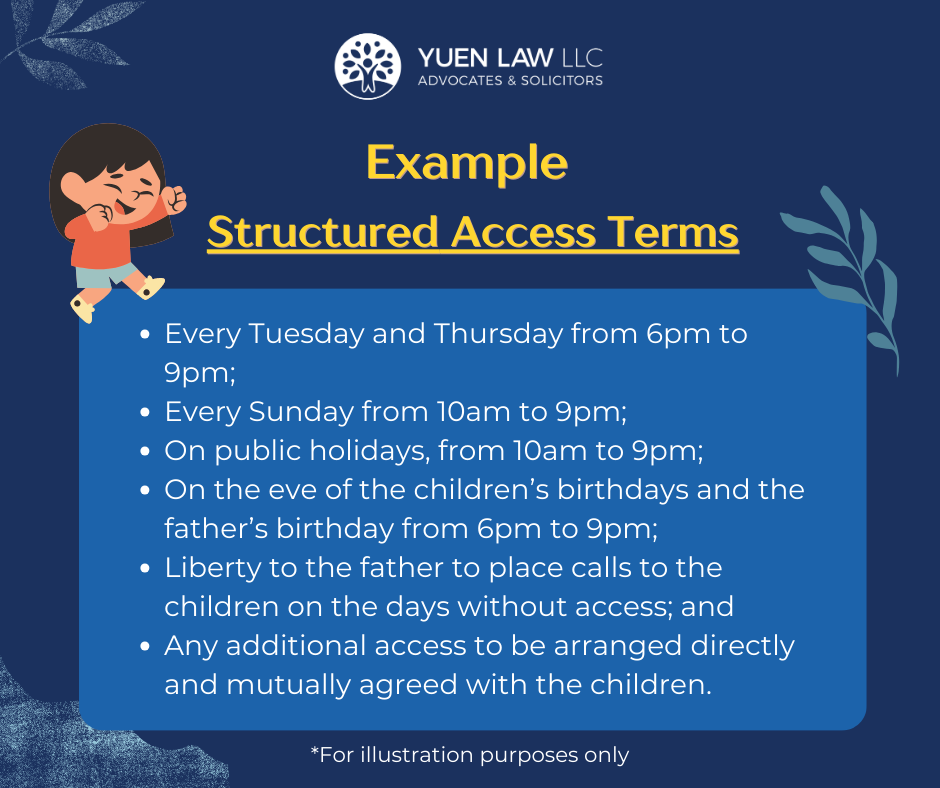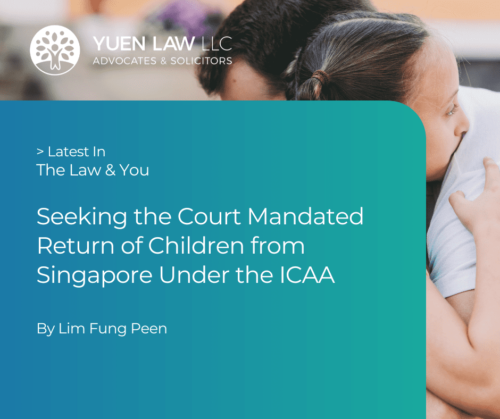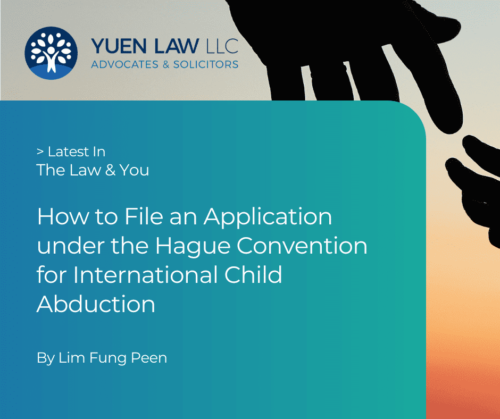Access To Children After Divorce
Filing for a divorce with children can be emotionally challenging and legally complex, as it involves addressing custody arrangements, child support, and ensuring the well-being of the children throughout the process.
In many custody battles, fathers who have a strained relationship with their ex-wife would often be faced with challenges in spending time with their children. It is not uncommon for some disgruntled ex-wife’s to prevent access to the father without good reason. Such fathers are often faced with lame reasons and untruths e.g. kids are busy, too tired, don’t want to see you, etc. On the other hand, some fathers may not comply with access order timings or behave irresponsibly which can have a negative impact on the child. The denial of access is one of the main anxieties and unhappiness for many fathers who do not have a good relationship with their ex. Dealing with a father who does not comply with access orders also can be stressful for the mother.
Custody and Access Orders
Though custody is usually made jointly to both parents, sole care and control is commonly granted to the mother – especially when the children are young or it concerns a daughter. This article explains, what access for the parent living apart from the child is, and how access terms are determined. We explain Custody, care and control is explored in our other article.
Fung Peen’s Nugget of Wisdom 📖
In situations where sole care and control is likely to be granted to the mother, it is important for fathers to seek proper advice on access arrangements. Thoughtfully planned access orders can ensure the children’s best interests are prioritized while fostering a meaningful and consistent relationship with their father.
Here again, any access orders would be made by the Court in the child’s best interests. Access orders are terms in a Court order that set out the custody details of when the children get to spend time with their father. Access orders are granted as they are deemed to be beneficial for the children for their healthy development.
Underpinning, access is the expectation by the Court of co-parenting of their children. Parents are expected to co-operate with each other for the benefit of their children even though there are getting divorced – it has been said to some warring spouses that they are divorcing each other not their children. Ensuring access to the children for the non-custodial parent is a reasonable expectation and the noncustodial parent should rest assured that the Court will consider all unreasonable denials of access seriously.
What Are Common Access Terms in Divorce?
Reasonable Access to Children
“Reasonable access” is a common access term and is preferred by the Court as it facilitates flexibility that can and should be worked out by the parents of the children as to when the child can spend time with the non-custodial parent, usually the father. The focus of reasonable access is not on a specific timing but on flexibility and mutual agreement in making arrangements. Reasonable access is ideal but it requires full co-operation by both parents and a flexible mindset.

An example of reasonable access for the father could include:
- On Thursdays (after school) to Sundays before noon;
- School holidays;
- Overnight access within the stipulated days above; and
- The right to take the children overseas during the June and November/December school holidays.
Note: the above example is for illustration purposes only. Each family’s situation is unique, and what is considered “reasonable” will vary based on the needs of the children and parents.
Structured Access to Children
Other than reasonable access, more detailed or “structured access” terms would include weekday, weekend, overnight, holiday access. In this time-tabled arrangement, specifics are spelt out and some parents go to the extent of stating birthdays and public holidays. The upside to this time-tabled access theoretically is certainty, clarity and regularity of access. The downside to this arrangement is it can lack flexibility, and it creates an atmosphere of losing out if access is not made available for some reason and make up access is not easily done – this can easily happen where ex-spouses are unable to communicate well to co-ordinate unforeseen changes.

An example of structured access for fathers could include:
- Any additional access to be arranged directly and mutually agreed with the children.
- Every Tuesday and Thursday from 6pm to 9pm;
- Every Sunday from 10am to 9pm;
- On public holidays, from 10am to 9pm;
- On the eve of the children’s birthdays and the father’s birthday from 6pm to 9pm;
- Liberty to the father to place calls to the children on the days without access; and
- Any additional access to be arranged directly and mutually agreed with the children.
Note: The above example is for illustration purposes only. Each family’s situation is unique, and the arrangement of a workable, structured timetable will depend on the specific needs of both the children and the parents.
Consideration For Access Terms
Access terms can be mutually agreed by the parents and if no agreement can be reached, ordered by the Court. Access terms can be decided by the Court during a divorce application or even before the divorce in an application for custody, care & control and access.
The Court takes a very practical approach to access terms and much depends on the needs of the child, availability of the parents as well as children. The overriding principle the Court is guided by is the access terms should be in the best interest of the child, and not either parent.
Access terms for young children in contrast to older teens can be very different as the latter age group of children are more independent. School hours, bedtimes, enrichment classes are all factors to consider when working access times out. Overnight access can be a bone of contention especially when the children are young or if the children are unfamiliar with the environment they are staying at. Each child is different and when co-parenting, ex-spouses have been reminded to be patient and flexible.
What If the Custodial Parent Says the Child Does Not Want to See The Non-Custodial Parent?
In such a situation, the best approach is to seek understanding rather than trying to disprove or attack the parent making such a claim. Such a statement may or not be true. Even if it is true, understanding why such an attitude is held by the child is important and to what extent.
When confronted with such “obstacles”, it may not be easy to discover the veracity of such a statement as the non-custodial parent may not even have the chance to speak to the child. In such a case, it would be best for a Court counsellor or MSF officer to come in to investigate discreetly, away from the eyes and earshot of either parent. In the cases we have done, Judges rely on such independent assessments and interviews before the Court makes a decision.
Can A Child Decide Whether He Wants to See A Parent?
In such Court applications the child’s perspective is taken into consideration, but it is certainly not the case that the child gets to decide. Here again, how much weight the opinion or preference of a child is given by the Court would depend on the child’s maturity.
It is not uncommon for a child to be say that they do not wish to see the non-custodial parent. This does not mean the issue of access ends there. In such cases, the Court has the power to order Supervised Access so that steps may be taken to slowly rebuild the relationship.
Can Access Terms Be Changed?
Yes. The Court considers if the requested change is beneficial for the child. Access terms may be changed especially when the children are matured and are older and are more independent. They may also be changed if there is a significant change in the parent’s residency or work hours e.g. relocation of parent or child to another country.
Enhanced Measures for the Enforcement Of Child Access Orders (ECAO)
📢 Legal Update
Effective from 2 January 2025
This will enhance ways to gain access when a parent with care and control of children deny their ex-spouse access.
The enhanced Enforcement of Child Access Orders will empower the Courts to better enforce child access orders, particularly in cases where parents with care and control of children deny their former spouses access to the children.
The additional powers include measures such as:
- Make-up access,
- Compensation for expenses. (For example, if a parent paid for holiday accommodation or travel fares for the children but was deprived of child access by the former spouse, as well as arranging for additional access if the former spouse was denied access to the child.)
- Mandatory counselling,
- Mediation,
- Therapeutic programmes or family support programmes,
- Security pledges and performance bonds to ensure future compliance with the order,
- A jail term and fine can be imposed on the parent the child lives with who fails to comply with the access orders without legitimate reasons.
The burden of proof will also be shifted from the parent who does not live with the child to the parent the child lives with to explain any alleged breaches of the child access order.
The approach to planning access terms is crucial and having good legal advice coupled with a with an understanding with what is best for the child is vital, be it before or during a divorce case.






